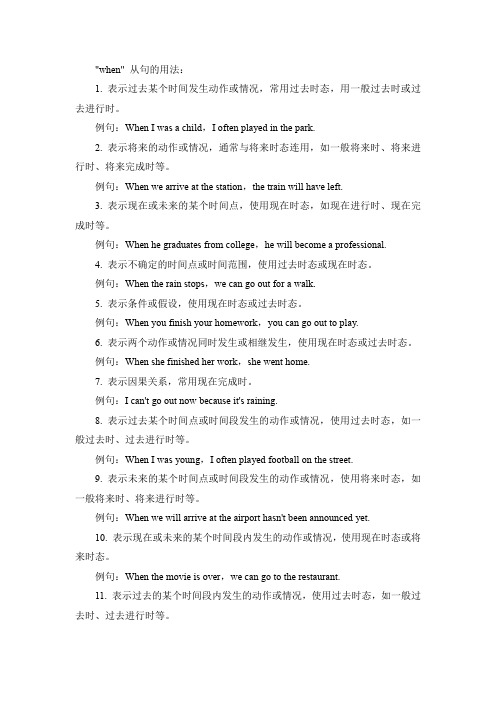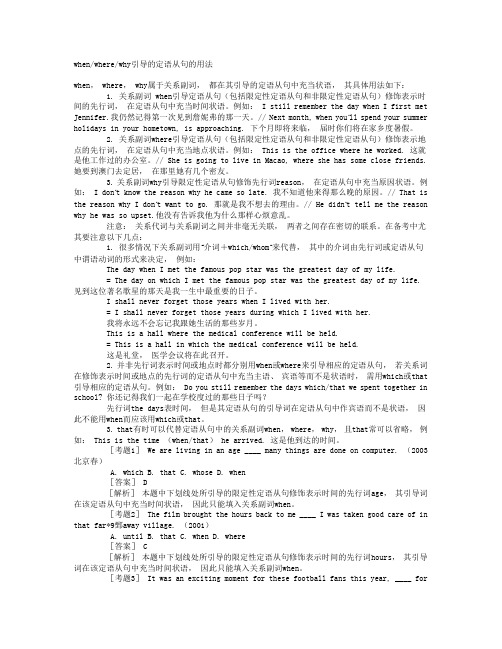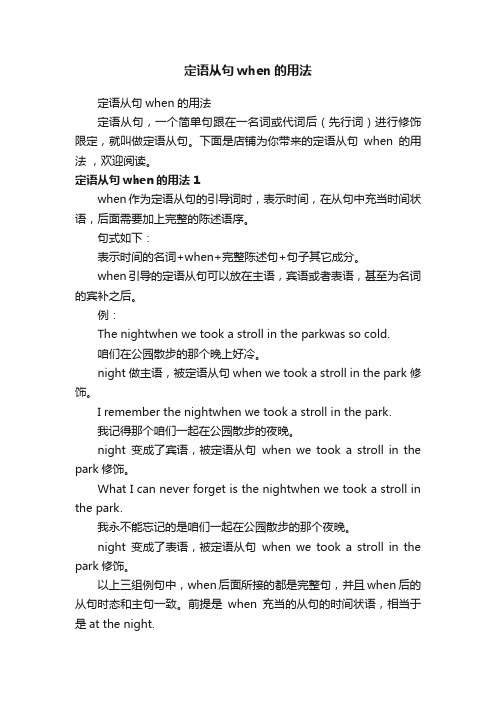when 引导的从句用法一
when从句的用法

"when" 从句的用法:1. 表示过去某个时间发生动作或情况,常用过去时态,用一般过去时或过去进行时。
例句:When I was a child,I often played in the park.2. 表示将来的动作或情况,通常与将来时态连用,如一般将来时、将来进行时、将来完成时等。
例句:When we arrive at the station,the train will have left.3. 表示现在或未来的某个时间点,使用现在时态,如现在进行时、现在完成时等。
例句:When he graduates from college,he will become a professional.4. 表示不确定的时间点或时间范围,使用过去时态或现在时态。
例句:When the rain stops,we can go out for a walk.5. 表示条件或假设,使用现在时态或过去时态。
例句:When you finish your homework,you can go out to play.6. 表示两个动作或情况同时发生或相继发生,使用现在时态或过去时态。
例句:When she finished her work,she went home.7. 表示因果关系,常用现在完成时。
例句:I can't go out now because it's raining.8. 表示过去某个时间点或时间段发生的动作或情况,使用过去时态,如一般过去时、过去进行时等。
例句:When I was young,I often played football on the street.9. 表示未来的某个时间点或时间段发生的动作或情况,使用将来时态,如一般将来时、将来进行时等。
例句:When we will arrive at the airport hasn't been announced yet.10. 表示现在或未来的某个时间段内发生的动作或情况,使用现在时态或将来时态。
when引导的定语从句的用法

when/where/why引导的定语从句的用法when, where, why属于关系副词,都在其引导的定语从句中充当状语,其具体用法如下:1. 关系副词 when引导定语从句(包括限定性定语从句和非限定性定语从句)修饰表示时间的先行词,在定语从句中充当时间状语。
例如: I still remember the day when I first met Jennifer.我仍然记得第一次见到詹妮弗的那一天。
// Next month, when you’ll spend your summer holidays in your hometown, is approaching. 下个月即将来临,届时你们将在家乡度暑假。
2. 关系副词where引导定语从句(包括限定性定语从句和非限定性定语从句)修饰表示地点的先行词,在定语从句中充当地点状语。
例如: This is the office where he worked. 这就是他工作过的办公室。
// She is going to live in Macao, where she has some close friends. 她要到澳门去定居,在那里她有几个密友。
3. 关系副词why引导限定性定语从句修饰先行词reason,在定语从句中充当原因状语。
例如: I don’t know the reason why he came so late. 我不知道他来得那么晚的原因。
// That is the reason why I don’t want to go. 那就是我不想去的理由。
// He didn’t tell me the reason why he was so upset.他没有告诉我他为什么那样心烦意乱。
注意:关系代词与关系副词之间并非毫无关联,两者之间存在密切的联系。
在备考中尤其要注意以下几点:1. 很多情况下关系副词用“介词+which/whom”来代替,其中的介词由先行词或定语从句中谓语动词的形式来决定,例如:The day when I met the famous pop star was the greatest day of my life.= The day on which I met the famous pop star was the greatest day of my life.见到这位著名歌星的那天是我一生中最重要的日子。
when 用法

when 用法"when" 是一个常用的副词和连词,用于引导一个时间、条件或原因从句,或用于询问时间、条件或原因。
以下是"when" 的一些详细用法:1. 引导时间从句:- "I will call you when I arrive home."(当我到家时,我会给你打电话。
)- "He was sleeping when the phone rang."(电话响时,他正在睡觉。
)2. 引导条件从句:- "I will go to the park when it stops raining."(当雨停下来时,我会去公园。
)- "She will start studying when she finishes her dinner."(当她吃完晚饭时,她会开始学习。
)3. 引导原因从句:- "He was late for the meeting when his car broke down."(当他的车抛锚时,他迟到了会议。
)- "She couldn't sleep when she had a lot on her mind."(当她有很多事情在心头时,她无法入睡。
)4. 用作连词表示同时发生的两个动作:- "I was reading a book when the doorbell rang."(当门铃响时,我正在看书。
)- "She was cooking dinner when her friend called."(当她的朋友打电话时,她正在做晚饭。
)5. 引导疑问句询问时间、条件或原因:- "When did you arrive?"(你什么时候到的?)- "When will they start the project?"(他们什么时候开始这个项目?)- "When can we meet again?"(我们什么时候可以再次见面?)总的来说,"when" 用于引导时间、条件和原因从句,用于描述同时发生的动作,或用于询问时间、条件和原因。
When 引导的时间状语从句

when 引导的时间状语从句
when “当…的时候”
1.when引导的时间状语从句可兼指时间点与时间段。
2.when引导时间状语从句时表示“当……的时候”, 从句的谓语动词可以是延
续性的也可以是非延续性的。
3.when引导时间状语从句时, 若从句的主语与主句的主语相同, 且在从句谓语
中含有be时,通常省略从句的主语和be。
引导的从句表示主从句的动作同时发生,或从句的动作在主句之前。
when引导的从句的谓语动词可以是延续性的动词,又可以是瞬时动词。
例如:When she came in, I stopped eating.
她进来时,我停止吃饭。
(瞬时动词)
When I lived in the countryside, I used to carry some water for him.
当我住在农村时,我常常为他担水。
(延续性的动词)
We were about to leave when he came in.
我们就要离开,就在那时他进来了。
定语从句when的用法

定语从句when的用法定语从句when的用法定语从句,一个简单句跟在一名词或代词后(先行词)进行修饰限定,就叫做定语从句。
下面是店铺为你带来的定语从句when的用法,欢迎阅读。
定语从句when的用法1when作为定语从句的引导词时,表示时间,在从句中充当时间状语,后面需要加上完整的陈述语序。
句式如下:表示时间的名词+when+完整陈述句+句子其它成分。
when引导的定语从句可以放在主语,宾语或者表语,甚至为名词的宾补之后。
例:The nightwhen we took a stroll in the parkwas so cold.咱们在公园散步的那个晚上好冷。
night 做主语,被定语从句when we took a stroll in the park 修饰。
I remember the nightwhen we took a stroll in the park.我记得那个咱们一起在公园散步的夜晚。
night变成了宾语,被定语从句when we took a stroll in the park修饰。
What I can never forget is the nightwhen we took a stroll in the park.我永不能忘记的是咱们一起在公园散步的那个夜晚。
night变成了表语,被定语从句when we took a stroll in the park修饰。
以上三组例句中,when后面所接的都是完整句,并且when 后的从句时态和主句一致。
前提是when充当的从句的时间状语,相当于是at the night.所以,以上三句,可以把when都改成at which。
写作必备when引导定语从句句式:There was a time when...... 曾经。
There was a time when people were never bothered by pollution.曾经人们不用为污染烦忧。
when,where,why引导的定语从句的用法

when,where,why引导的定语从句的用法when,where,why引导的定语从句的用法想要掌握定语从句,需要掌握引导词的用法,下面是店铺分享给大家的when,where,why引导的定语从句的用法,希望对大家有帮助。
when,where,why引导的定语从句的用法篇1when, where, why属于关系副词,都在其引导的定语从句中充当状语,其具体用法如下:1.关系副词 when引导定语从句(包括限定性定语从句和非限定性定语从句)修饰表示时间的先行词,在定语从句中充当时间状语。
例如: I still remember the day when I first met Jennifer.我仍然记得第一次见到詹妮弗的那一天。
// Next month, when you’ll spend your summer holidays in your hometown, is approaching. 下个月即将来临,届时你们将在家乡度暑假。
2. 关系副词where引导定语从句(包括限定性定语从句和非限定性定语从句)修饰表示地点的先行词,在定语从句中充当地点状语。
例如: This is the office where he worked. 这就是他工作过的办公室。
// She is going to live in Macao, where she has some close friends. 她要到澳门去定居,在那里她有几个密友。
3. 关系副词why引导限定性定语从句修饰先行词reason,在定语从句中充当原因状语。
例如: I don’t know the reason why he came so late. 我不知道他来得那么晚的原因。
// That is the reason why I don’t want to go. 那就是我不想去的理由。
// He didn’t tell me the reason why he was so upset.他没有告诉我他为什么那样心烦意乱。
when的用法前后的时态
when的用法前后的时态
when的用法前后的时态如下:
如果是宾语从句,那么时态问题就参考宾语从句的做法,如果是时间状语从句,则基本有4种。
1、表示有规律的,都用一般现在时。
如:Water turns into steam when we heat it.
2、表示将来的事情,用主将从现(主句将来时,从句一般现在时)。
如:I will i tell him when he comes back.
3、表示过去两个有先后的动作,都用过去式。
如:When he came back,I told!him the news.
4、表示一个动作正在进行(过去进行时),另一个动作插入(过去式)。
如:I met my teacher when i was walking in the street.
扩展资料:when可指时间点,又可指时间段,从句中可用延续性动词,也可用非延续性动词。
when是说明从句的动作和主句的动作时可以是同时发生,也可以是先后发生。
由when引导的时间状语从句,主句用过去进行时,从句应用一般过去时。
when引导的时间状语从句
when引导的时间状语从句,不能不提起as和while之迟辟智美创作一、when可以和延续性动词连用,也可以和长久性动词连用;而while和as只能和延续性动词连用.① Why do you want a new job when youve got such a good one already?(get为长久性动词)你已经找到如此好的工作,为何还想再找新的?②Sorry,I was out when you called me.(call为长久性动词)对不起,你打德律风时我刚好外出了.③Strike while the iron is hot.(is为延续性动词,暗示一种继续的状态)连成一气.④ The students took notes as they listened.(listen为延续性动词)学生们边听课边做笔记.二、when从句的谓语动词可以在主句谓语举措之前、之后或同时发生;while和as从句的谓语举措必需是和主句谓语举措同时发生.1.从句举措在主句举措前发生,只用 when.①When he had finished his homework,he took a short rest.(finished先发生)当他完成作业后,他休息了一会儿.②When I got to the airport,the guests had left.(got to后发生)当我赶到飞机场时,客人们已经离开了.2.从句举措和主句举措同时发生,且从句举措为延续性动词时,when,while,as都可使用.①When /While /As we were dancing,a stranger came in.(dance为延续性动词)当我们跳舞时,一位陌生人走了进来.②When /While /As she was making a phonecall,I was writing a letter.(make为延续性动词)当她在打德律风时,我正在写信.3.当主句、从句举措同时进行,从句举措的时间概念淡化,而主要暗示主句举措发生的布景或条件时,只能用 as.这时,as常暗示“随着……”;“一边……,一边……”之意.① As the time went on,the weather got worse.(as暗示“随着……”之意)② The atmosphere gets thinner and thinner as the height increases.随着高度的增加,年夜气越来越稀薄.③As years go by,China is getting stronger and richer.随着时间一年一年过去,中国变得越来越富强了.④The little girls sang as they went.小姑娘们一边走,一边唱.⑤The sad mother sat on the roadside,shouting as she was crying.伤心的妈妈坐在路边,边哭边叫.4.在将来时从句中,经常使用when,且从句须用一般时取代将来时.①You shall borrow the book when I have finished reading it.在我读完这本书后,你可以借阅.②When the manager comes here for a visit next week,Ill talk with him about this.下周,经理来这观赏时,我会和他谈谈此事.三、when用于暗示“一……就……”的句型中(指过去的事情).sb.had hardly(=scarcely) done sth.when...=Hardly / Scarcely had sb.done sth.when...①I had hardly /scarcely closed my eyes when someone knocked at the door.=Hardly / Scarcely had I closed my eyes when someone knocked at the door.我刚一闭上眼,就有人在敲门了.②I had hardly /scarcely entered my room when the telephone rang.=Hardly /Scarcely had I entered my room when the telephone rang.我刚一走进房门,德律风就响了。
关系副词when引导的定语从句解析
关系副词when引导的定语从句解析导语:关系副词when引导定语从句,下面和店铺一起详细了解一下关系副词when引导的定语从句的具体用法吧!When引导限定性定语从句是对先行词进行修饰限定,在语法上就是一个定语。
例句1:Thereare occasionswhen(onwhich)onemustyield.任何人都有不得不屈服的时候。
例句2:Iwillneverforgetthedayswhen(inwhich)wesharedalltherosesandth orns.我永远都不会忘记我们在一起同甘共苦的日子。
关系副词when引导非限定性定语从句When引导非限定性定语从句时对先行词的'补充说明,在语法上其实相当于补语。
例句1:ItwasonMid-AutumnFestival,whenallfamilymembersreunite,thatIleftmyhomet ownforastrangecityalone.正是在中秋节这个家人团圆的日子,我却独自离开家乡去了一个陌生的城市。
注释:when在这里引导非限定性定语从句,并在从句中充当状语,这里也可以用onwhich代替。
关系副词when引导定语从句时的模糊化在when引导定语从句时,大多数时候定语从句的先行词都是比较明显的时间词,比如:time,year,month等。
但是,有一些抽象的先行词具有模糊时间概念的,比如:stay,visit,occasion,interval,moment,span,age等。
此时,如果定语从句需要用关系副词连接,同样也用when。
例句1:IwillbrandmygoldenstayinParisonmyheartwhenIledahappyandfruitfullife.我会将我在巴黎那段幸福而有收获的日子铭记于心。
注释:此时先行词stay就是一个具有模糊时间概念的先行词,when在定语从句中充当时间状语,相当于duringwhich。
when引导的时间状语从句用法 有哪些用法
when引导的时间状语从句用法有哪些用法when引导的从句的谓语动词可以是延续性的动词,可以是瞬间动词。
并且when有时表示“就在那时”。
when引导的时间状语从句用法有哪些用法1when引导的时间状语从句用法1.在过去,when从句和主句的动作先后发生解释:表示在过去,主句和从句包含的动作先后发生了,或者主句或从句的动作先发生。
句子结构:when从句和主句都用过去式。
主句过去式常用was(were) about to,was(were) on the point 等词组。
2.在过去,主句动作发生时,when从句动作正进行解释:表示在过去,当主句的包含动作发生时,从句的动作在当时也正在进行。
此类句子主句动词为瞬间性,从句动词为延续性。
句子结构:when从句用过去进行时,主句用过去式。
3.在过去,when从句动作发生时,主句动作正进行解释:表示在过去,当从句的动作发生时,主句的动作在当时也正在进行。
此类句子主句动词为延续性,从句动词为瞬间性。
句子结构:when从句用过去式,主句用过去进行时。
4.在过去,when从句动作发生时,主句动作已完成解释:表示在过去,当从句包含的动作发生时,主句的动作在从句动作发生之前已经完成了。
句子结构:when从句用过去式,主句用过去完成时。
2时间状语从句用表示时间的连词连接一个句子作状语,这样的主从复合句就是时间状语从句。
连接时间状语从句的连接词有:when, before, after, while, as soon as, until, since...... 这里要注意一点的是,如果主句是一般将来时,从句只能用一般现在时表示将来意义。
由when,while引导的时间状语从句。
例如:Strike while the iron is hot.趁热打铁。
When you think you know nothing, then you begin to know something.当你以为自己一无所知的时候,你就是在开始知道一些事物了。
- 1、下载文档前请自行甄别文档内容的完整性,平台不提供额外的编辑、内容补充、找答案等附加服务。
- 2、"仅部分预览"的文档,不可在线预览部分如存在完整性等问题,可反馈申请退款(可完整预览的文档不适用该条件!)。
- 3、如文档侵犯您的权益,请联系客服反馈,我们会尽快为您处理(人工客服工作时间:9:00-18:30)。
when 引导的从句用法一、引导时间状语从句1. 表示"当……的时候",相当于at the moment when。
例如:When we got to the cinema, the film had been on for half an hour. 当我们到达电影院时,电影已放映半小时了。
She was writing a letter when I came in. 当我进来时,她在写信。
2. 表示"一……就……",相当于as soon as。
例如: The students got up when the bell rang. 铃声一响,学生们就起床了。
I'll ring you up when I arrive in Beijing. 我一到北京就给你打电话。
3. 表示"就在这时;当时",相当于just at the moment或just then .例如: We were about to start out when it began to rain heavily. 我们正要启程,就在这时,天下起了大雨。
He had just returned from one business trip when he was asked to make another one. 他刚刚出差回来,这时,又叫他再次出差。
4. 表示"每当;每次",相当于every time或whenever。
例如: She always turns to us for help when she is in trouble.每当她遇到困难,她总是向我们求助。
It is freezing cold here when it snows. 每当这儿下雪,天气就十分寒冷。
5. 表示"当……之后;在……以后",相当于after the time that。
例如: We went home when the film was over. 电影结束以后,我们回家去了。
When she got home, she started to prepare supper. 她回到家后,开始准备晚饭。
二、引导条件状语从句when引导的条件状语从句相当于if/ in case引导的条件状语从句.例如:When there is no gravity, our feet can no longer stay on the ground. 如果没有重力,我们的脚就不能够在地面上站稳。
Turn off the switch when anything goes wrong with the machine. 如果机器发生故障,就把电闸关上。
三、引导原因状语从句when引导原因状语从句时,相当于since/now that引导的原因状语从句。
例如: How can they learn anything when they spend all their spare time watching television? 他们把所有的空闲时间都用来看电视了,还能学到什么东西呢? Why do you want a new job when you have got such a good one? 既然你已经有了这么好的一份工作,为什么还要再找新的工作呢?四、引导让步状语从句when引导的让步状语从句相当于though或although引导的让步状语从句。
例如: He usually walks when he might ride. 虽然有车可乘,但他通常是步行。
The little girl can tell right from wrong when she is only twelve. 这个小女孩虽然只有十二岁,却能分清是非。
五、引导定语从句when引导定语从句时,有时可用in which或on which来替代。
例如:We'll put off the picnic until next week, when the weather may be better. 我们要把野餐推迟到下周,那时可能天气好些。
I'll never forget the day when I joined the Party. 我将永远不会忘记我入党的那一天。
六、引导名词性从句 1. 引导宾语从句。
例如: Please tell us when his father will return from abroad. 请告诉我们他父亲什么时候从国外回来。
2. 引导主语从句。
例如:When they will leave for Australia hasn't been decided. 他们什么时候动身去澳大利亚还没有决定。
3. 引导表语从句。
例如: The question is when they will get so much money to set up the factory. 问题是他们将在什么时候弄到这么多钱来把这个工厂办起来。
when, while 和as 引导时间状语从句的用法这三个词的意思很简单,都有“当……时候”的意思。
但学生经常会问三个词的区别在哪儿,特别是在做选择题的时候。
别说是学生,就我个人而言,做这样的选择题要保证百分之百的正确也是不可能的。
现根据大量的实例和个人的思考,做一点小结,供大家参考。
一、when 的用法如果只从现象来看,when 从句用的最多的是一般过去时,而主句的时态没有限制,根据具体情况而定1. When he was a child he was always trying out new ideas. 他小时候就常常试验一些新的设想。
2. When she came into my room, I was just reading a book. 她走进我房间时,我正在看书。
3. Were you writing when the teacher came in? 老师进来的时候,你在写信吗?4. Sorry, I was out when you called me. 对不起,你打电话来的时候我出去了。
5. He was on the point of leaving when someone knocked at the door. 他正要走,这时有人敲门。
6. I thought of it just when you opened your mouth. 就在你要说话的时候,我也想到了。
7. I had hardly[scarcely] closed my eyes when someone knocked at the door.我刚一闭上眼,就有人在敲门了。
根据以上的例句,我们可以总结出一点:when 从句的A事件,相当于另一个事件B发生的时间点。
也就是说,when 从句的重点不在动作本身发生的状态,而只是把它作为一个时间点,所以when 多数情况下用的是一般过去时,则不用正在进行时。
因为如果用正在进行时,它表示的就是一段时间而不是一个时间点了。
根据这一点,有的文章补充说:when 从句的动词大多是瞬时动词。
这种说法也可以参照。
实际上,when 从句也可以有其它的时态,但几乎也不用进行时,因为它也只是作为一个时间参照点。
例如:1. When I got to the airport, the guests had left. 当我赶到飞机场时,客人们已经离开了。
2. When he had finished his homework, he took a short rest.当他完成作业后,他休息了一会儿。
3. Why do you want a new job when you have got such a good one already?你已经找到如此好的工作,为何还想再找新的?4. You shall borrow the book when I have finished reading it.在我读完这本书后,你可以借阅。
5. When the manager comes here for a visit next week, I’ll talk with him about this.下周,经理来这参观时,我会和他谈谈此事。
二、while 的用法相比于when 来说,while 从句的侧重点就不一样了。
while 从句的侧重点在于描述动作正在发生的状态,它的意思是:当while 事件正在发生的时候,另一件事如何如何。
所以,while 从句一般用的是正在进行时。
而另一件事的状态没有硬性的要求,根据具体情况而定。
例如:1. While my wife was reading the newspaper, I was watching TV.当妻子正在看报纸的时候,我正在看电视。
2. While Jim was mending his bike, Lin Tao came to see him.正当吉姆修自行车时,林涛来看他。
3. While they were talking, the bell rang. 正在他们谈话的时候,上课铃响了。
4. You can’t do your homework while you’re watching TV.你不能一边看电视一边做家庭作业。
5. While John was sitting biting his nails, I was working out a plan to get us home.约翰坐在那里咬指甲时,我正在制定一个回家的计划。
从时间的角度来看,while 表示的是一段时间,是一个过程。
这是while 的侧重点。
因此,如果含有“一段时间”的含义的时候,就可以用while。
6. Strike while the iron is hot. 趁热打铁。
这句话中,是说趁着铁是热的这段时间,赶紧打铁。
如果换成when 意思就变了,相当于说铁只热了一下,打一下,然后铁就冷了。
这显然不符合文意。
—I'm going to the post office.—While you're there, can you get me some stamps?三、as 的用法as 从句表示的也是一件事情正在发生,另一件事也正在进行当中。
但与while 从句不同的是,as 从句用的一般不用正在进行时,而只是一般过去时。
as 从句一般可以翻译成“边……边……”。
